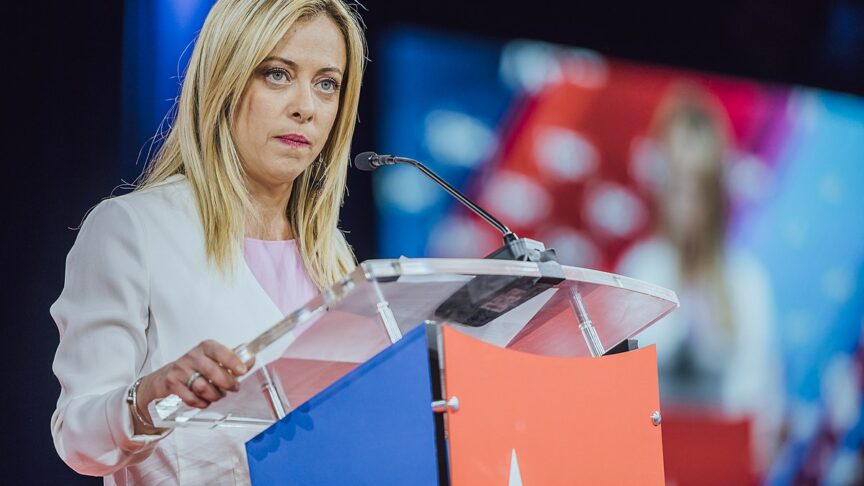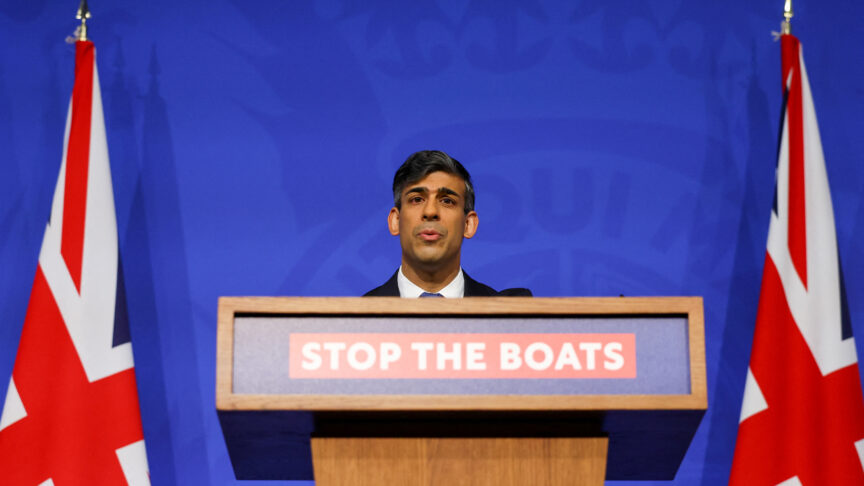The moment to choose: How migration politics could damage the Meloni government’s EU credentials
The Meloni government has largely adopted a ‘Russia-pragmatic’ approach to its EU and Ukraine policies. But pressure over migration within the coalition could harm relations with other European states
Italy’s coalition governments are rarely easy for their leaders to manage. This is certainly the case for Giorgia Meloni, the country’s new prime minister. Her coalition partners – Matteo Salvini’s League and Silvio Berlusconi’s Forza Italia – are parties traditionally sympathetic to Russia. And, although the government remains steadfast in its support for Ukraine, Salvini is making its life difficult. The veteran troublemaker challenges Meloni on a daily basis, particularly on her amenable stance towards the European Union and any perception of ‘going soft’ on migration. The trouble for Meloni is that she may one day be forced to resolve the dilemma of maintaining good relations with the EU while striking an ever-hardening stance on migration.
A matter of weeks into the new government taking office, migration rose to the fore when Rome refused to allow migrants to disembark from an NGO-owned rescue ship, Ocean Viking. The ship later docked in France, but not before the episode had provoked a war of words with both Paris and the European Commission. The spat was over the timing and manner in which the Meloni government publicly thanked the French for taking the vessel before the agreement had been officially announced.
Italy then stoked the simmering tensions by signing a joint statement with Cyprus, Malta, and Greece denouncing the EU’s refugee relocation scheme. They argued that the current arrangements place a disproportionate responsibility for asylum applications on southern states where people arrive by sea. The statement requested a more equal, efficient, and permanent system of relocation across the EU, as well as a more structured approach towards privately owned ships rescuing migrants in the Mediterranean. The Italian government’s decision to sign this letter looked like a deliberate challenge to the EU asylum mechanism.
All this came after Meloni had made what many EU capitals will have regarded as a reassuring start. She has a good relationship with Ukrainian president Volodymyr Zelensky, and met NATO secretary-general Jens Stoltenberg, who praised Italy’s contribution to the alliance. During the latest virtual G7 meeting, Meloni committed to continue providing military support to Ukraine. She urged Ukraine’s allies to maintain their unity and talked of the need to start thinking about the country’s economic and social reconstruction. She also had a cordial first unofficial meeting with French president Emmanuel Macron at COP27 in Egypt.
Two domestic factors may influence Meloni’s management of her government. Firstly, the internal balance of power in the coalition government. From its foundation in 2012, Meloni took her Brothers of Italy party to 31.4 per cent in the latest polls, which is above the share her party won in September’s general election. In contrast, the League and Forza Italia returned disappointing results and Brothers of Italy benefitted from this switch in right-wing support. But both parties are still vital for Meloni’s government to stay in power. Secondly, Meloni knows that Italy badly needs economic growth and stability, especially concerning the spending of the EU’s covid recovery fund and project implementation. The EU will hold her accountable for that stability and for the fulfilment of spending targets. If she decides to oppose EU strategies and targets, as she has already done on migration, dialogue with her European counterparts risks becoming strained to a significant degree.
The League may agitate ever more noisily if Italy makes no progress on the question of migration management
The League is not nearly as EU-friendly as Meloni has acted so far, and it may agitate ever more noisily if Italy makes no progress on the question of migration management. Having made an issue out of Ocean Viking and gone public with its opposition to the current system, the Meloni government may have set itself a target it is unable to achieve. David Cameron’s government in the United Kingdom made a similar mistake when it pledged to get net migration down to the “tens of thousands” – which it was palpably unable to do, and the British people effectively made the choice for it by voting for Brexit.
The government may be vulnerable on other fronts too. While Italy’s stance on Russia may today be a safe space for Meloni to adopt a credible pose in the eyes of the EU, NATO, and the United States, there is no guarantee Salvini will remain equally committed. In a long-war scenario, high inflation and soaring energy costs could make this a difficult sell to the Italian public – and provide ammunition for Salvini. And beyond the government, while the opposition Democratic Party under Enrico Letta is currently supportive of the government on Ukraine, it will choose a new leader next year. Some statements from likely candidates have indicated that this could precipitate a gradual shift towards less interventionist and more ‘pacifist’ positions. The Democratic Party may in turn become less supportive in recognising Russia as the aggressor and supporting justice for Ukraine.
Meloni could attempt to continue with her ‘Russia-pragmatic’ approach, holding to constructive support for the EU’s response to the war and a commitment to European sovereignty and security. Yet the prime minister has also evidently already experimented with a ‘migration-populist’ approach, which indeed is core to her Brothers of Italy party as well as the League. At some point she may be forced to decide between them. Her participation in COP27, the G20, and the recent G7 – and the possibility of being part of multilateral frameworks of action and decision-making processes – could nudge her in one direction even while she is being pulled in another. But, once she does choose, Meloni may find she either loses friends in Europe, or loses the coalition partner she relies on so heavily, if uneasily, to remain in power.
The European Council on Foreign Relations does not take collective positions. ECFR publications only represent the views of their individual authors.



